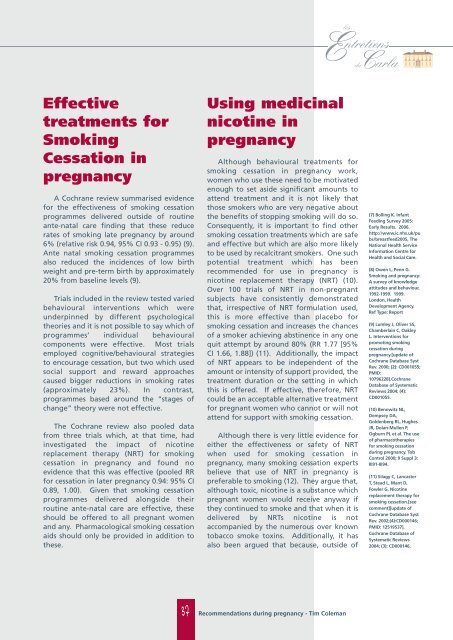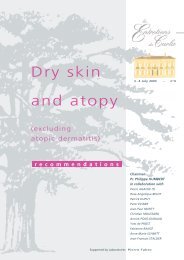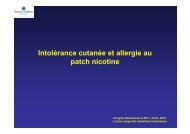Nicotine replacement therapy … - Carlos A ... - Entretiens du Carla
Nicotine replacement therapy … - Carlos A ... - Entretiens du Carla
Nicotine replacement therapy … - Carlos A ... - Entretiens du Carla
Create successful ePaper yourself
Turn your PDF publications into a flip-book with our unique Google optimized e-Paper software.
Effective<br />
treatments for<br />
Smoking<br />
Cessation in<br />
pregnancy<br />
A Cochrane review summarised evidence<br />
for the effectiveness of smoking cessation<br />
programmes delivered outside of routine<br />
ante-natal care finding that these re<strong>du</strong>ce<br />
rates of smoking late pregnancy by around<br />
6% (relative risk 0.94, 95% CI 0.93 - 0.95) (9).<br />
Ante natal smoking cessation programmes<br />
also re<strong>du</strong>ced the incidences of low birth<br />
weight and pre-term birth by approximately<br />
20% from baseline levels (9).<br />
Trials included in the review tested varied<br />
behavioural interventions which were<br />
underpinned by different psychological<br />
theories and it is not possible to say which of<br />
programmes’ indivi<strong>du</strong>al behavioural<br />
components were effective. Most trials<br />
employed cognitive/behavioural strategies<br />
to encourage cessation, but two which used<br />
social support and reward approaches<br />
caused bigger re<strong>du</strong>ctions in smoking rates<br />
(approximately 23%). In contrast,<br />
programmes based around the “stages of<br />
change” theory were not effective.<br />
The Cochrane review also pooled data<br />
from three trials which, at that time, had<br />
investigated the impact of nicotine<br />
<strong>replacement</strong> <strong>therapy</strong> (NRT) for smoking<br />
cessation in pregnancy and found no<br />
evidence that this was effective (pooled RR<br />
for cessation in later pregnancy 0.94: 95% CI<br />
0.89, 1.00). Given that smoking cessation<br />
programmes delivered alongside their<br />
routine ante-natal care are effective, these<br />
should be offered to all pregnant women<br />
and any. Pharmacological smoking cessation<br />
aids should only be provided in addition to<br />
these.<br />
37<br />
Using medicinal<br />
nicotine in<br />
pregnancy<br />
Although behavioural treatments for<br />
smoking cessation in pregnancy work,<br />
women who use these need to be motivated<br />
enough to set aside significant amounts to<br />
attend treatment and it is not likely that<br />
those smokers who are very negative about<br />
the benefits of stopping smoking will do so.<br />
Consequently, it is important to find other<br />
smoking cessation treatments which are safe<br />
and effective but which are also more likely<br />
to be used by recalcitrant smokers. One such<br />
potential treatment which has been<br />
recommended for use in pregnancy is<br />
nicotine <strong>replacement</strong> <strong>therapy</strong> (NRT) (10).<br />
Over 100 trials of NRT in non-pregnant<br />
subjects have consistently demonstrated<br />
that, irrespective of NRT formulation used,<br />
this is more effective than placebo for<br />
smoking cessation and increases the chances<br />
of a smoker achieving abstinence in any one<br />
quit attempt by around 80% (RR 1.77 [95%<br />
CI 1.66, 1.88]) (11). Additionally, the impact<br />
of NRT appears to be independent of the<br />
amount or intensity of support provided, the<br />
treatment <strong>du</strong>ration or the setting in which<br />
this is offered. If effective, therefore, NRT<br />
could be an acceptable alternative treatment<br />
for pregnant women who cannot or will not<br />
attend for support with smoking cessation.<br />
Although there is very little evidence for<br />
either the effectiveness or safety of NRT<br />
when used for smoking cessation in<br />
pregnancy, many smoking cessation experts<br />
believe that use of NRT in pregnancy is<br />
preferable to smoking (12). They argue that,<br />
although toxic, nicotine is a substance which<br />
pregnant women would receive anyway if<br />
they continued to smoke and that when it is<br />
delivered by NRTs nicotine is not<br />
accompanied by the numerous over known<br />
tobacco smoke toxins. Additionally, it has<br />
also been argued that because, outside of<br />
Recommendations <strong>du</strong>ring pregnancy - Tim Coleman<br />
(7) Bolling K. Infant<br />
Feeding Survey 2005:<br />
Early Results. 2006.<br />
http://www.ic.nhs.uk/pu<br />
bs/breastfeed2005, The<br />
National Health Service<br />
Information Centre for<br />
Health and Social Care.<br />
(8) Owen L, Penn G.<br />
Smoking and pregnancy:<br />
A survey of knowledge<br />
attitudes and behaviour,<br />
1992-1999. 1999.<br />
London, Health<br />
Development Agency.<br />
Ref Type: Report<br />
(9) Lumley J, Oliver SS,<br />
Chamberlain C, Oakley<br />
L. Interventions for<br />
promoting smoking<br />
cessation <strong>du</strong>ring<br />
pregnancy.[update of<br />
Cochrane Database Syst<br />
Rev. 2000; (2): CD001055;<br />
PMID:<br />
10796228].Cochrane<br />
Database of Systematic<br />
Reviews 2004; (4):<br />
CD001055.<br />
(10) Benowitz NL,<br />
Dempsey DA,<br />
Goldenberg RL, Hughes<br />
JR, Dolan-Mullen P,<br />
Ogburn PL et al. The use<br />
of pharmacotherapies<br />
for smoking cessation<br />
<strong>du</strong>ring pregnancy. Tob<br />
Control 2000; 9 Suppl 3:<br />
III91-III94.<br />
(11) Silagy C, Lancaster<br />
T, Stead L, Mant D,<br />
Fowler G. <strong>Nicotine</strong><br />
<strong>replacement</strong> <strong>therapy</strong> for<br />
smoking cessation.[see<br />
comment][update of<br />
Cochrane Database Syst<br />
Rev. 2002;(4):CD000146;<br />
PMID: 12519537].<br />
Cochrane Database of<br />
Systematic Reviews<br />
2004; (3): CD000146.






